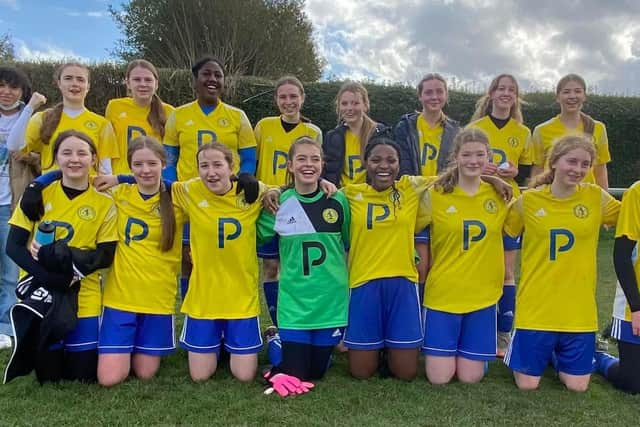The growing interest in football among Yorkshire's girls and how Lionesses' win will leave a legacy
The Lionesses lived up to their name. Now the pride of the nation, they have set a precedent – a chapter in history for younger role models to emulate, a legacy to live on.
Finally football has come home to England and it is women, who have battled for so long for their rightful place in a traditionally male-dominated sport, who have lifted a major trophy thanks to their true grit and a steely determination to succeed.
Advertisement
Hide AdAdvertisement
Hide AdLed by coach Sarina Wiegman, the Lionesses, including Millie Bright from Sheffield, Harrogate’s Rachel Daly and Whitby’s Beth Mead, secured a 2-1 win over Germany in the final of the UEFA Women’s Euro 2022 at London’s Wembley Stadium at the end of last month.


Watched by millions, perhaps the most important viewers were the fans, the stalwart supporters who have followed the team – their chants of encouragement audible from the stands in stadiums where they have loyally watched them play and, finally, achieve their goal.
For Livia Sheffield, and the many other young players who are forging their way forward in the sport, this win reinforced the fact that football is a sport for all.
Livia’s interest developed from attending sessions for toddlers. She eventually joined a girls football team at Thackley Juniors.


Advertisement
Hide AdAdvertisement
Hide AdHer father, Jamie, coaches both boys and girls teams there and is about to start his seventh season with the club.
Thackley Juniors, near Bradford, have seen a rapid growth in girls joining. Since 2019 the club has seen its girls teams increase from four to seven, and it hopes to have created an eighth by the end of the year.
It’s certainly proactive when it comes to encouraging girls into the game.
Livia’s mum, Laura Sheffield, explains how those involved have leafleted the local primary schools and put a banner on the fence outside the club’s home to promote it.
Advertisement
Hide AdAdvertisement
Hide AdTaster training sessions have also been held to give girls the opportunity to play.
“I think people were hesitant about what the environment would be like and what other people think about girls playing football,” says Laura.
But they soon realise the amount of encouragement and support, she says, and she hopes the Lionesses’ win will help to break down any hesitations in the future. “Livia has never been fazed by it being seen as more of a boys’ sport, and I think [the victory] has given that reassurance to many girls that it is possible,” says Laura.
“They don’t just have to do a generic job or sport deemed suitable for a female – if I want to play football and I want to be successful at it I know that is now achievable.”
She hopes the impact will also spread to other sports.
Advertisement
Hide AdAdvertisement
Hide Ad“I hope that you see more girls taking up cricket for example – I think it’s about the wider impact this will have as well.”
Horsforth St Margaret’s FC, near Leeds, has also seen more girls taking up football in recent years.
Austin Greenwood, a coach at the club who was previously head of the girls section, became involved when his eldest daughter, Molly, now 15, joined the Dribblers session aged seven. Youngest daughter, 13-year-old Isla, also played with the club.
During that time, Austin says the club has seen the girls teams grow from two or three teams to 34 junior girls teams and two adult female teams.
“I think we are one of the biggest in the county,” he says.
Advertisement
Hide AdAdvertisement
Hide Ad“But there’s no magic formula. We have done a bit of advertising over the years, and when the FA launched its Wildcats scheme (a non-competitive football programme for girls) we got involved in that,” says Austin, adding that they’ve previously had 80 girls turn up to a taster session.
The biggest issue they face is the lack of volunteer coaches, but Austin appreciates people don’t always have the time to take on the commitment.
He explains they currently have waiting lists for both the boys and girls teams, and increasing their coaches would provide more opportunities for new members to play. Perhaps unsurprisingly, the club received inquiries during the week following the Lionesses’ win.
“We have had a few inquiries after everything that went on – there have been a few spikes after televised tournaments and there seems to be a growing interest generally in girls’ football,” says Austin.
Advertisement
Hide AdAdvertisement
Hide AdThe game, he says, has great benefits. As well as being accessible to all backgrounds, levels and abilities, football isn’t an expensive sport – you don’t need equipment and it isn’t reliant on the weather, he explains.
“It’s important people have a hobby, that they are active and they don’t spend all day on their mobile phones,” he says. “Being part of a team is important for later life.
“It’s inclusive as well. Everybody should be able to do what they want to do, and we are there to provide the opportunity for girls who want to play sport.”
Last month, a number of girls’ Emerging Talent Centre (ETC) licences were allocated across the country, in a bid to see the number of young female players engaged in Football Association programmes rise from 1,722 to more than 4,200 by the end of the 2023-2024 season.
Advertisement
Hide AdAdvertisement
Hide AdAimed at players aged eight to 16, the centres are designed to give talented girls in England more opportunities to develop their abilities.
In Yorkshire, Barnsley Women FC, Bradford City Community Foundation, Doncaster Rovers Belles FC, Hull City Ladies FC, Leeds United Foundation, Rotherham United Community Sports Trust and Sheffield United FC were granted allocated for the centres.
Qasim says the club is also keen to encourage more girls and women from ethnic minority communities too.
“We have a diverse demographic in Bradford.
“The stereotype was British children who were playing football, but we are now seeing a lot of the BME community coming in and the South Asian community as well.
Advertisement
Hide AdAdvertisement
Hide Ad“One of our strategies was to increase the number of BME players and staff we have across the club and we have really improved on that.”
Qasim hopes the legacy of the women’s Euro win will encourage players from the UK to develop careers in football.
“I do think if you see it, you believe it and young girls who were not into football or felt there wa
